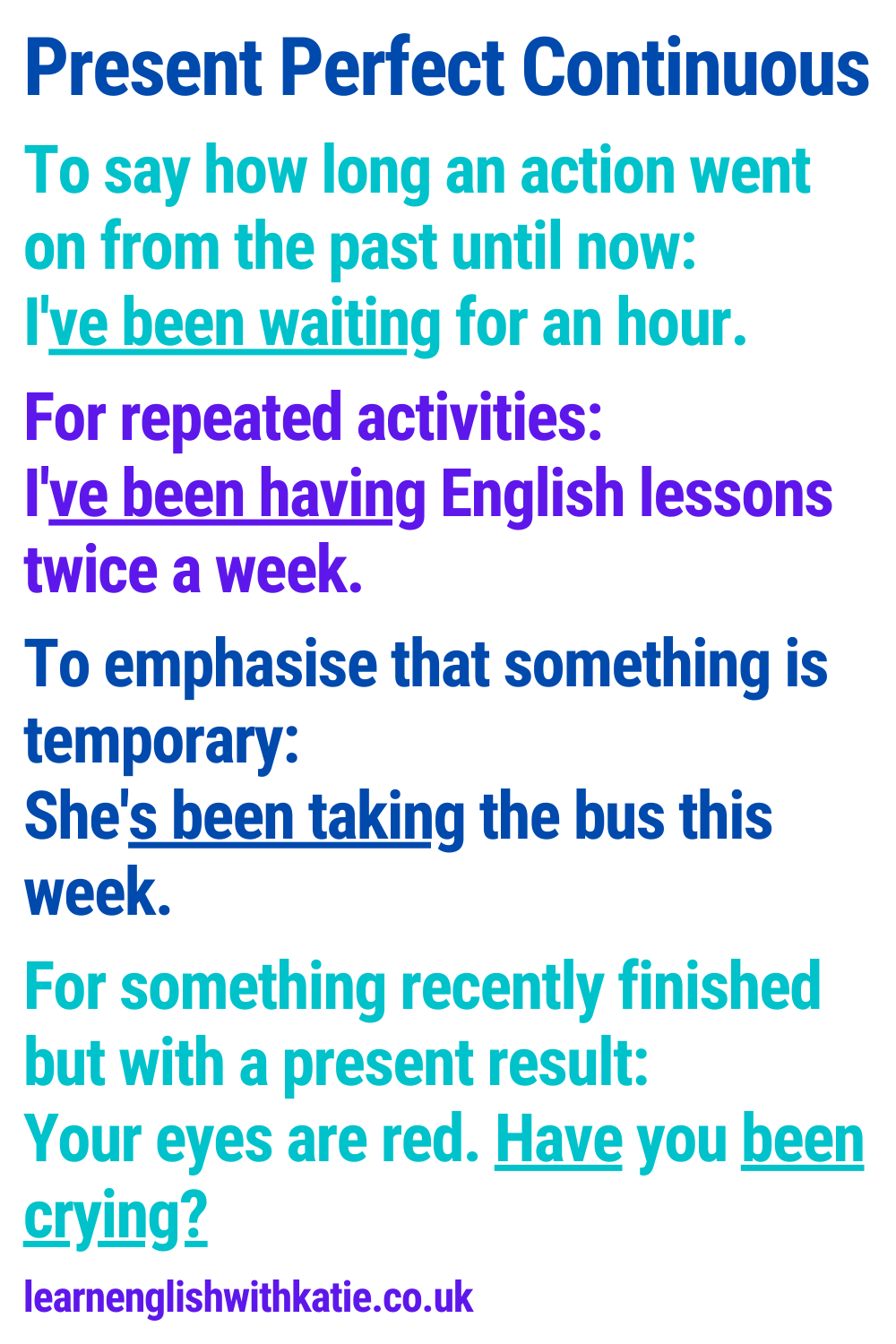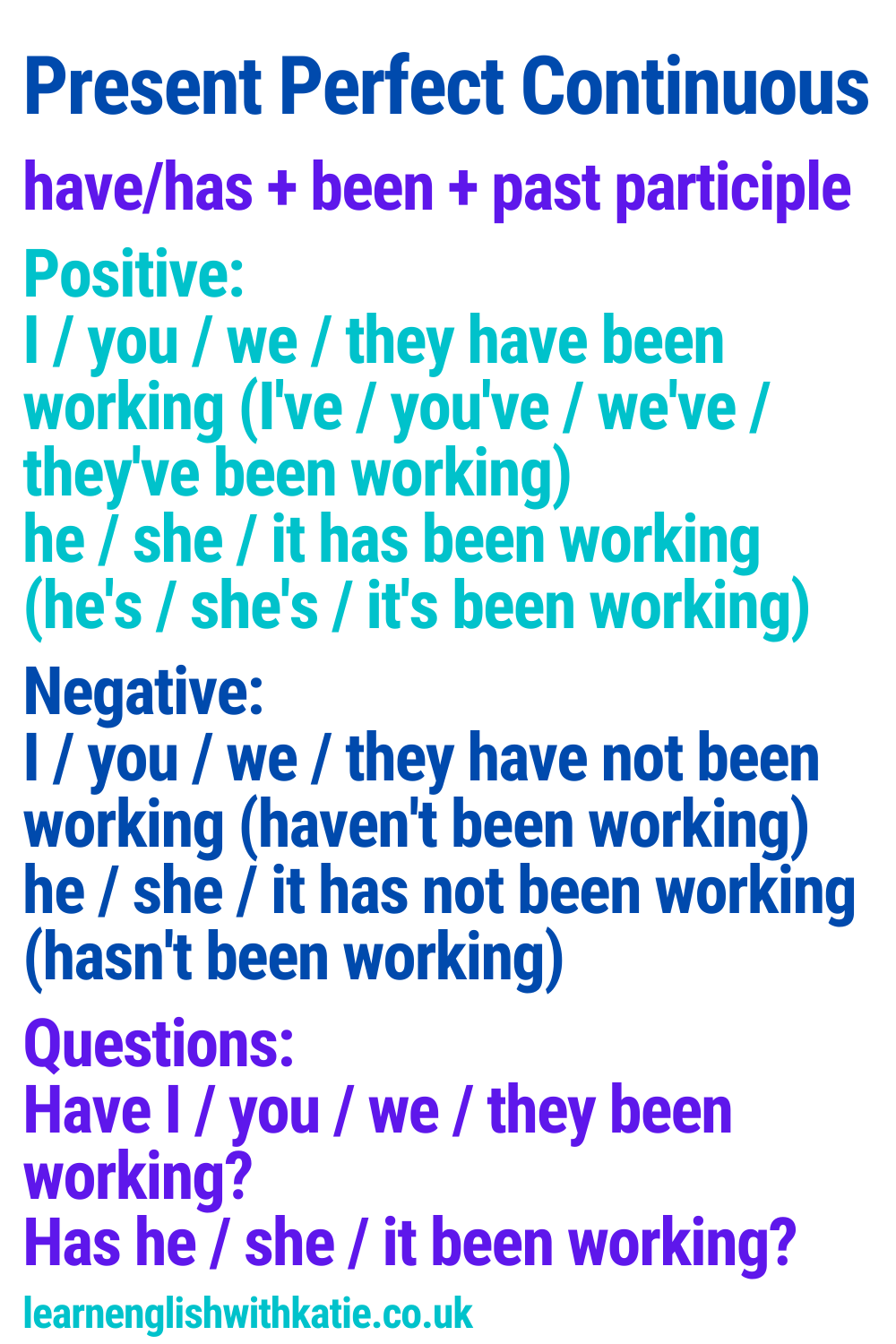|
This tense is a combination of present continuous and present perfect. The perfect part is because there is a link between the past and the present and the continuous part indicates that the action continues for some time. If you haven't studied the other present tenses yet, you can find them here. Or click "read more" to learn about the present perfect continuous. Formation present perfect continuous = have / has + been + ___ing Positive: Work: I / you / we / they have been working, he / she / it has been working (Or: I’ve / you’ve / we’ve / they’ve been working, he’s / she’s / it’s been working) Take: I / you / we / they have been taking, he / she / it has been taking Negative: Work: I / you / we / they have not been working, he / she / it has not been working (I / you / we / they haven’t been working, he / she / it hasn’t been working) Take: I / you / we / they have not been taking, he / she / it has not been taking Questions: Work: Have I / you / we / they been working? Has he / she / it been working? Take: Have I / you / we / they been taking? Has he / she / it been taking? Uses 1. To say how long an activity has been going on for. It might continue into the future or it might not: She's been working here since January so we’re going to give her a pay rise. (Not finished.) Where have you been? I’ve been waiting for an hour. (Just finished.) (Often with “for” or “since”.) 2. To describe a repeated activity: I’ve been going to church every Sunday my whole life. He’s been having English lessons twice a week since September. 3. To emphasise that a recent activity is temporary: My car is still at the garage so I’ve been taking the bus this week. I’ve been looking after my neighbour’s cats while they are on holiday. 4. To describe an activity which recently finished but with a present result: Your eyes are red. Have you been crying? It looks a bit wet outside. It’s been raining. Important notes 1. If we are talking about “how long”, sometimes we can use the present perfect (simple) or present perfect continuous without much change in the meaning but it’s more common to use the present perfect continuous with action verbs and the present perfect (simple) with non-action verbs. Action verbs: I’ve been playing the piano for three years. (This is more common.) I’ve played the piano for three years. (This is correct but less common.) Non-action verbs: I’ve known him for three years. (“Know” is a non-action verb so present perfect continuous isn’t possible.) 2. With “live” and “work”, we tend to use the two tenses interchangeably. There is little no difference between these two sentences: I’ve lived here for six months. I’ve been living here for six months. We might be more likely to use the continuous form to emphasise that something is temporary and the present perfect (simple) if it’s more permanent but with “live” and “work” this difference is very small or not important. Common mistakes 1. I learn / I’m learning English for five months. ❌ I’ve been learning English for five months. ✔️ Use the present perfect continuous, not the present simple or continuous. 2. I’ve been knowing him for years. ❌ I’ve known him for years. ✔️ You can’t use present perfect continuous with non-action verbs. 3. How long have you studying French? ❌ How long have you been studying French? ✔️ Don’t forget to include “been”. 4. Your eyes are red. Are you crying?❌ Your eyes are red. Have you been crying? ✔️ “Are crying” and “have been crying” have a different meaning. The first one means the person is still crying now. The second one means the person stopped crying a short time ago. 5. She has been breaking her leg. ❌ She has broken her leg. ✔️ You can’t use the present perfect continuous for short actions. 6. I have been writing ten emails. ❌ I have written ten emails. ✔️ Use the present perfect continuous to say “how long” but use the present perfect to say “how many”. Have you tried my present tenses quiz yet? Click here to test your knowledge. If you would like more lessons and tips for how to learn English, click the button below and sign up for my newsletters:
0 Comments
Your comment will be posted after it is approved.
Leave a Reply. |
About the blogFollow the blog for mini lessons and tips on how to improve your English. Categories
All
Archives
July 2024
|


 RSS Feed
RSS Feed
